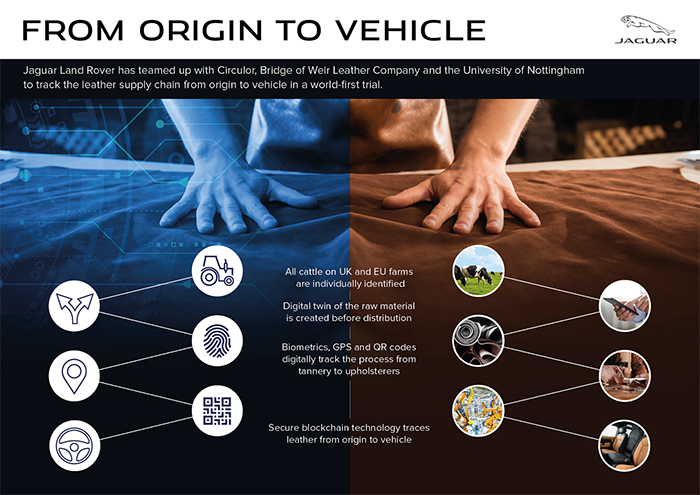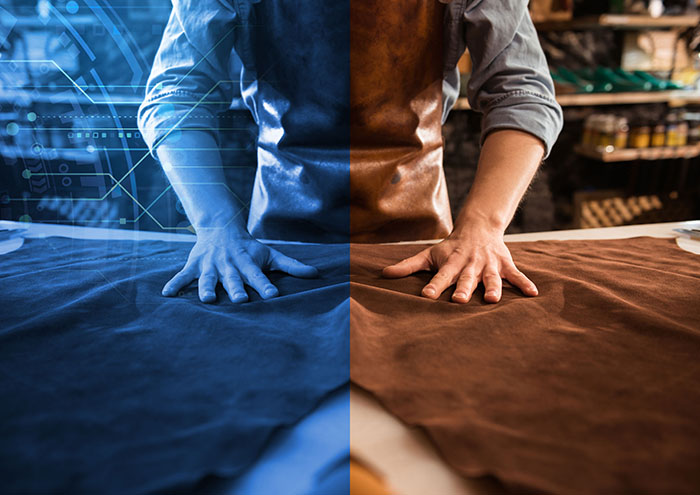Jaguar Land Rover has trialled the use of secure blockchain technology to ensure full transparency within a sustainable leather supply chain.

In the world-first, Jaguar Land Rover partnered with supply chain traceability provider Circulor, leading UK leather manufacturer Bridge of Weir Leather Company and the University of Nottingham to trial the use of traceability technology in the leather supply chain.
As well as tracking compliance, the digital process enabled Jaguar Land Rover to assess the carbon footprint of its leather supply network, working with UK-based Bridge of Weir Leather Company to trace its lowest carbon leather from farm to finished article – all part of Jaguar Land Rover’s commitment to reducing the environmental and ethical impact of its products across their lifecycle.
Jaguar Land Rover is committed to offering customers more sustainable and responsible material choices for their vehicle interiors, such as the premium natural fibre Eucalyptus textile interior available on Range Rover Evoque, and Kvadrat – a refined high-quality wool blend textile that’s paired with a suede cloth made from 53 recycled plastic bottles per vehicle – available on Evoque, Range Rover Velar and Jaguar’s all-electric I-PACE.
As part of the Innovate UK-funded research, a ‘digital twin’ of the raw material was created, allowing its progress to be tracked through the leather supply chain simultaneously in the real world and digitally. A combination of GPS data, biometrics and QR codes was used to digitally verify the movement of leather at every step of the process using blockchain technology.
Defining the verification process has created a repeatable blueprint for tracing a single piece of leather at every stage. It can be used across Jaguar Land Rover’s global supply chain and by other industries that rely on leather, such as fashion and footwear.
The project is part of Jaguar Land Rover’s Reimagine strategy: a sustainability-rich combination of modern luxury, unique customer experiences, and positive societal impact.
Reimagine aims to achieve net zero carbon emissions across its supply chain, products and operations by 2039. Jaguar Land Rover will work with industry experts to improve sustainability, reduce emissions and collaborate on next-generation technology, data and software development leadership.
Dave Owen, Jaguar Land Rover Executive Director of Supply Chain, said: “We are currently restructuring our supply chain as part of Reimagine, with a focus on transparency and sustainability. The outcome from this world-first trial will allow us to further improve the sustainability of the leather supply chain around the globe, ensuring the complete traceability of raw materials from origin to vehicle.
“This is one step in our journey to net zero carbon emissions across our supply chain, products and operations by 2039, enabled by leading edge digital capabilities.”
Through InMotion, its venture capital and mobility services arm, Jaguar Land Rover previously announced an investment in Circulor, allowing the company to source premium materials with greater transparency as to the provenance, welfare, and compliance of suppliers throughout its networks.
The technology could be deployed to trace other commodities. Circulor is already using blockchain to improve the traceability of minerals used for electric vehicle batteries. Blockchain technology is impossible to modify or tamper with, giving customers greater confidence that the sustainable supply chain is authentic, and all materials have been sustainably sourced.
Dr Warren Bowden, Innovation and Sustainability Director of Scottish Leather Group, said “In partnership with Jaguar Land Rover and the University of Nottingham, we believe there is a clear opportunity to implement blockchain technology to enhance the existing, world-leading standards of traceability and transparency that exist within UK agriculture and its Cattle Tracing Scheme.
“At Bridge of Weir, we see the potential to create carbon-positive leather – if we source from local farms where the livestock is grass fed, where there is no deforestation, and we couple this responsible approach to sourcing with ongoing innovation to create zero carbon and zero waste manufacturing processes. The blockchain technology developed in this trial will enable each stage in the process, and the entire leather supply chain, to be accurately tracked and measured.”


COMMENTS